This post came about in the light of Holocaust Remembrance Day and the Trump administration’s recent ban on immigration to the US for people of certain nationalities despite them holing valid US visa or green cards – which both fell on the same day past weekend. As the descendant of European refugees, many of whom died in the Holocaust precisely because they were refused entry to the United States, I must speak out against this grave injustice. The two are so directly linked that it is certainly cynical or utterly ignorant of President Trump to sign his executive order on the same day as Holocaust Remembrance Day. I could not help but translate and share some of my family’s many letters from the war. At a time when increasing illiberalism is leading to renewed borders, xenophobia and, so sadly, to Holocaust denial, these letters should be a reminder of what happened and what should never be forgotten. To me, they are also a reminder of where the world is heading when the rights of any group of people – no matter from which place or of which ethnicity or religion – are no longer guaranteed by society.
My great-grandparents Emil and Margret Kohlmann were fortunate to be able to leave Germany for Argentina in 1935, where my great-grandmother’s family had a large crops-trading business. Few of Emil’s family members managed to get out of Germany, despite their relative wealth and connections. For most, the situation was completely hopeless.
In his futile attempts to help his siblings and their families to leave Germany, Emil sent many letters from his new home in Buenos Aires – most of which started to be returned as ‘undeliverable’ after a certain time. Only this past December, when on holidays in South America visiting my grandmother, did we find this undelivered letter.
Buenos Aires, Dec 3rd 1941
My dear family!
Through HAPAG, I received a response to my cable and we are saddened to learn that your emigration is countered with difficulty.
The day before yesterday, we received a letter from dear Martin who informed us of the ‘resettling’ [‘Umsiedlung’] of our dearest sister Mally and her daughter. You can imagine that the cable from HAPAG as well as the letter from Martin are putting us into great sadness and the thought of how we can help you is occupying us day and night. I heard from Strauss New York that all requirements for your emigration to Cuba are fulfilled, hopefully the emigration ban is only temporary so that you will have the opportunity to be back together with your children soon. I will write again to Strauss today to see that as soon as he hears of the ban to be lifted he will do everything to make your swift emigration possible. Also because of Margrit Cologne, I will give Strauss the same instructions.
As soon as you learn of the new address of our unfortunate sister Mally, I ask you to please inform me of it immediately so that I can ask our local committee if it is possible to send food and money to Mally’s new location. Further, could I ask you, dear Max, to let me know if her father is getting paid his monthly support.
Since quite a while we haven’t received word from neither Edith nor Ernst, even though we wrote to both multiple times. A letter, which we sent to Edith was returned [undeliverable] a long time ago. We know through you that both children are well but, in any case, we ask you to send us their new addresses immediately, as we want to be at all times in touch with them, to support them with our advice and help. Also from Helmuth we haven’t heard in a long time; Should he not be with our cousins in Texas anymore, we ask you to please send us his address as well. You are especially unlucky with your emigration, if this scoundrel Dr. M. s. Zt. hadn’t embezzled the sum you could have already been in the US. We can not despair and not lose hope that, however dark the sky has turned for us, the sun will shine again one day. Martin let me know that he will most likely also be ‘resettled’ [‘Umgesiedelt’], so we are writing to you as we don’t know whether he is still in Germany or not; if so, please give word to Martin that the emigration of Margrit has been instituted and that in case the emigration ban will not be lifted and Martin and his family are ‘resettled’, we will of course not only look after your children but see them as our own. Please keep us updated and let us know of any changes as soon as possible via telegraph.
With all our heart to you all,
Emil
After 1941, most of Emil’s family had been ‘resettled’ by the Nazis. This meant they were forced into Ghettos or concentration camps and all letters sent to them were simply returned by the Reichspost as ‘undeliverable’. At a time before modern telecommunication, very little information came out of Germany. Only at the end of the war would my great-grandparents hear from their family again. Their niece Margrit – one of the few survivors – explained what happened to them in a short but chilling letter, imploring that they help her to leave the country that was no longer her home.
Neustadt, May 24th 1945
Dear Aunt Margret, my dear Uncle Emil and Robert,
That you are receiving a sign of life from me is a miracle, as we haven’t only died one death, we have already died twenty times over, and like a miracle we have survived. I will only report briefly and the most important things, as otherwise I would be writing for days.
In December 1941, father, mother and I were evacuated to Riga. A transport of thousands of people. We were allowed to take 40kg of luggage with us. Money, gold and watches were taken from us. After great strains, we arrived in Riga. Immediately, many men were taken to another terrible camp. Father, thank god, not. We came into a Ghetto, into the homes of Latvian Jews, who were shot the day before. A great famine came. Mother’s toe froze off and had to be amputated. She was under incredible pain. Then came the commandos to the trains, ports etc.. We went with a commando and brought frozen potatoes and hard bread with us. One began to trade pieces of clothing for bread and butter with people. Then some were hanged or shot for trading and they made us watch. Uncle Max also came to the Ghetto. He came from another camp and told us that aunt Cläre was [?] gone, also shot dead. He was completely shattered. Uncle Max had to work with the SS. One day they found his own wedding ring with him. He was arrested. Father brought him food every day. One day, they shot uncle. This is how uncle Max and aunt Cläre ended. Father worked for the rail company [‘Reichsbahn’]. Then I became deadly ill with scarlet fever, which lasted for 4 moths because my heart was attacked. Mother and father were gravely worried. Then I was badly jaundiced at the time when the rail company came into town and father, too. Because I was ill, mother stayed with me and we wanted to follow father two weeks later. But this didn’t happen. A great operation was underway in the Ghetto, children, the sick and the old. Then mother and I were sent to the concentration camp [‘KZ’]. We had it terribly there. Hard labour and immense hunger. Every now and then we heard from father, which was our bright spot. Every 14 days there was an operation and I was always worried about mother. After one year we came to father. For 14 days we were the happiest people because we were together. Then came July 27th, the worst day of my life, there was a big SS operation and father and mother were taken away. I had lost everything, my beloved good parents. Then the Russians came to Riga, we went on a ship, and then to a concentration camp in [the] Danzig-Stuttgart-Extermination-Camp. We were part of the Reichsbahn and should go back to the Reichsbahn. For 6 weeks we managed to get by in Stutthof. Then we came to the Reichsbahn in Stolp. There it wasn’t as bad but hard labour below ground. The Russians then also arrived there. The ‘Scharführer’ put us on a train and we went back and forth for 10 days as the Russians were already everywhere. For 10 days we had no food. Then we landed in Burgraben by Danzig. There, we were left alone by the SS, grenades fell constantly, and many of our people died. There was typhoid in the camp. On the last day, the SS came under terrible grenade hail and brought us to Stutthof into the concentration camp. There we got water-soup for lunch and 4 boiled potatoes in the evening. We were there for three weeks. Then the Russians also arrived there and with our last strength we boarded a train. Then we laid in a forest for two days and were put on a barge. Person-to-person. Many died there. We came to the island Hela. It was bombed heavily. Once again death was after us. Then we came onto another ship. Many people in one hatch. For 6 days we went without food or water. People went mad, we were without strength. Corpses were thrown overboard. Then the crew left the ship. We were out on the ocean, 100s of meters from land. The Norwegians took over the commando on our ship and with a small barge they brought us closer to land. We thank them for our lives. With the help of a barge we came on land 10 at a time. Then came the SS and shots were fired. Then we came to Neustadt and they wanted to send us on another ship, which was supposed to be blown up at sea. Suddenly they said everyone has to go back, tanks came, the English arrived, we were free. That my beloved parents didn’t live to see this. Not one day I was without mother. In this time I aged by 20 years. Now, I collapsed. Since 5 days I am in bed with high fever. I can barely eat. I’m lying in the city hospital and am so weak that I can’t stand. My hope is my brother. Please send me his address immediately. I am yearning for just a few kind words. Father and mother have given me so much love. Dear uncle Emil, GET ME OUT OF HERE, we need a ‘Anforderung’ to get out, and I want to get out as quickly as possible. Please help me my dear loved aunt Margret and dear uncle Emil. An Englishman is sending this letter. I am in Neustadt (in Holstein) prison camp. Until your answer arrives I am safe at the hospital in the camp. Again, you are my last hope. Father said to me, stick with uncle Emil.
With greetings and kisses, Your niece,
Margrit
When I visited the Jewish Museum in Berlin and Yad Vashem in Jerusalem, I found memorial pages for many of my perished relatives. Among them also Margrit’s father Martin Kohlmann.
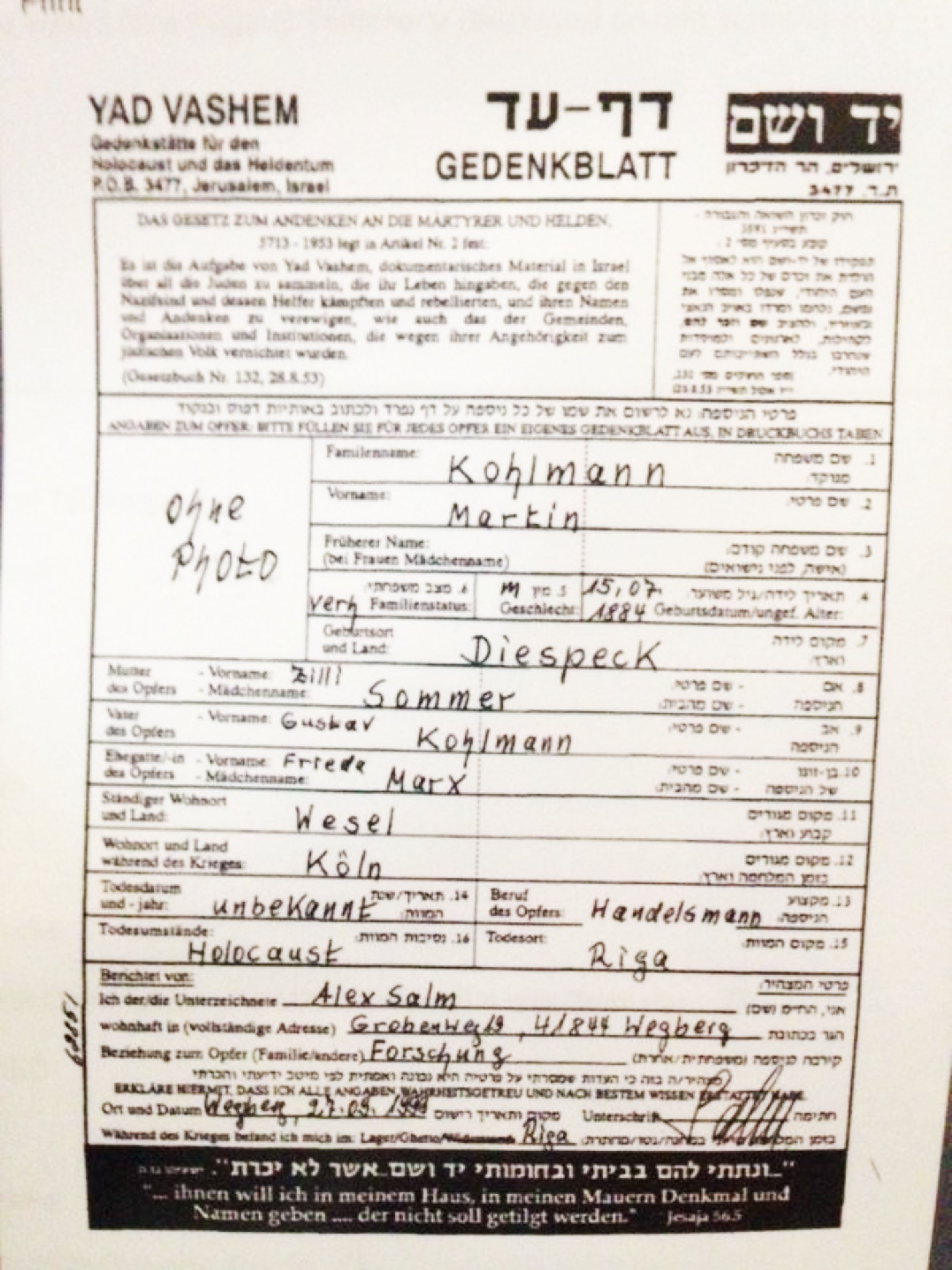
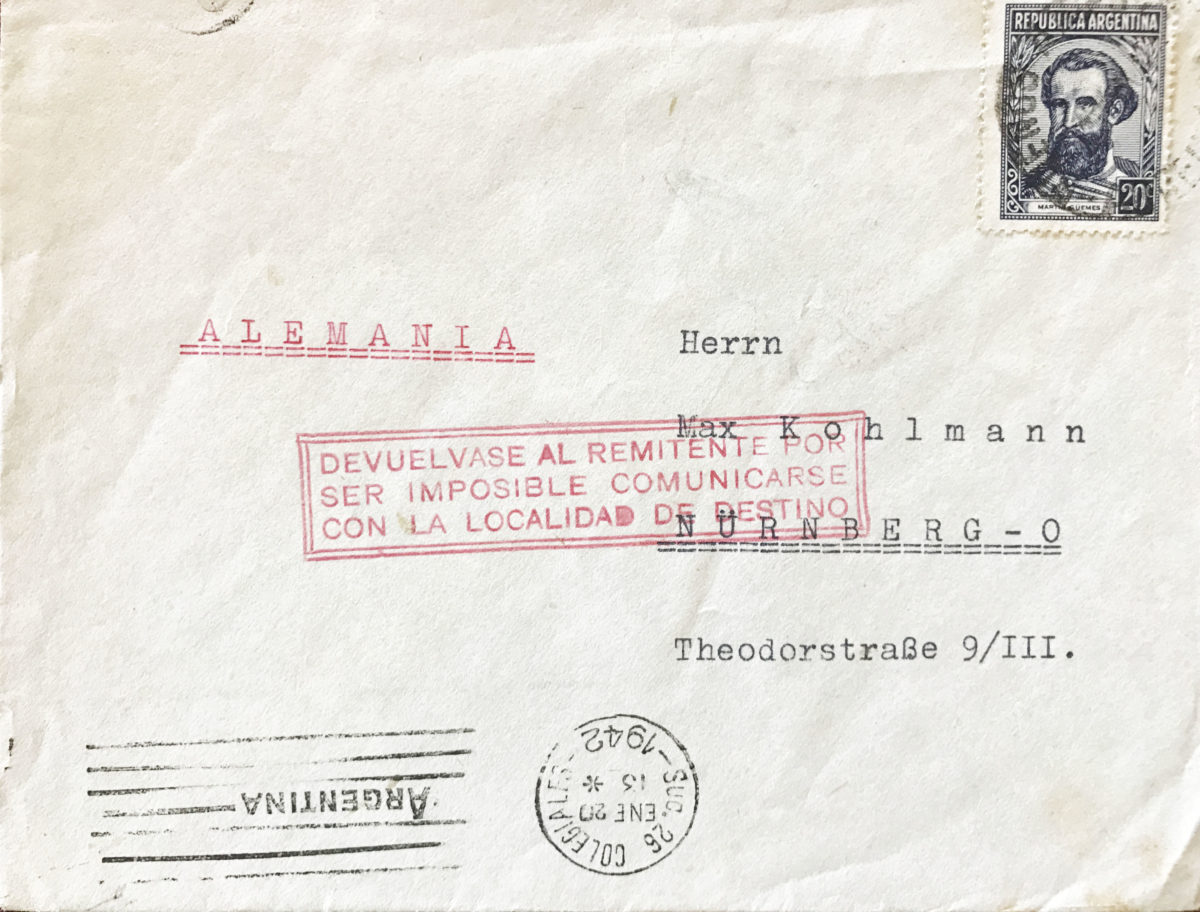
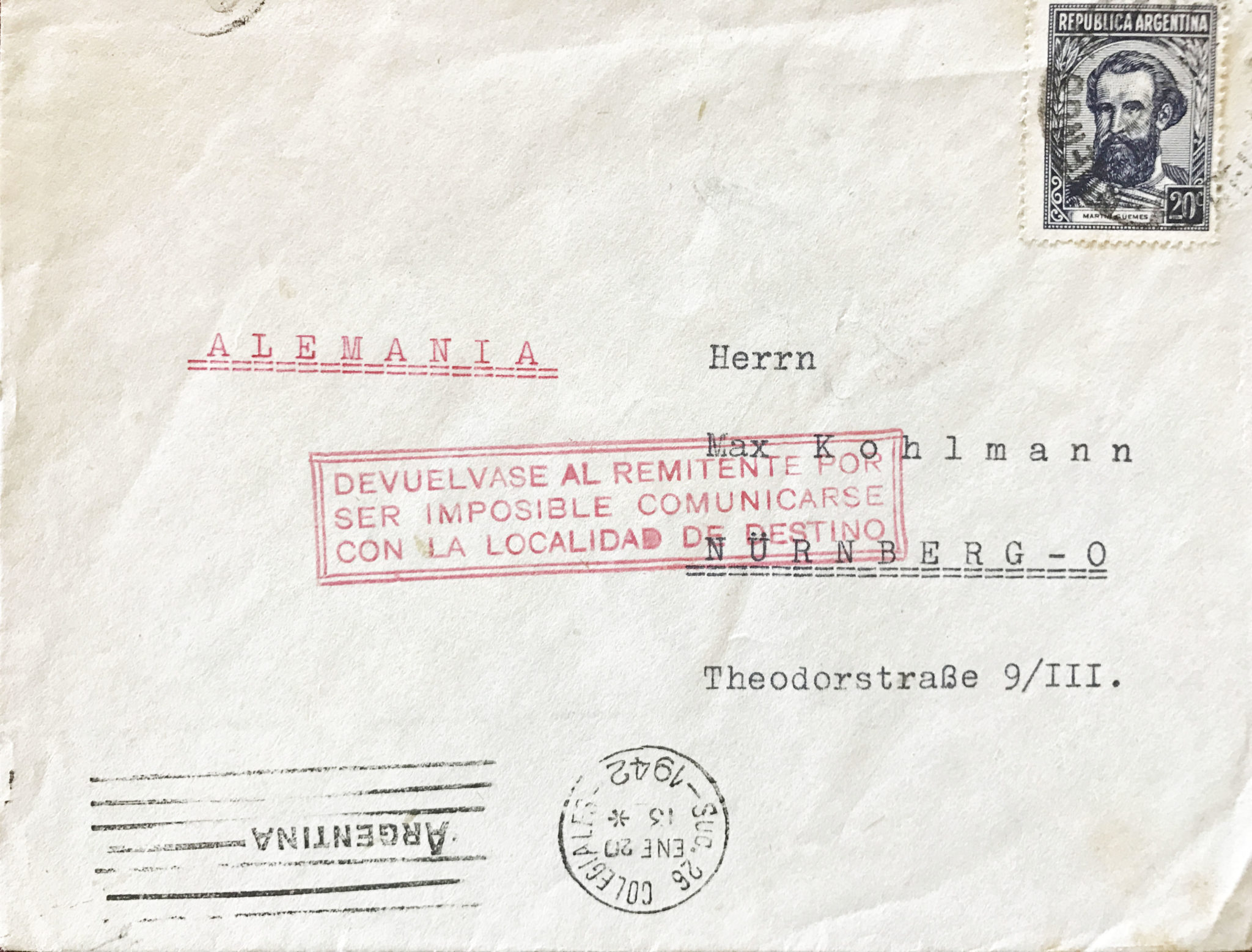
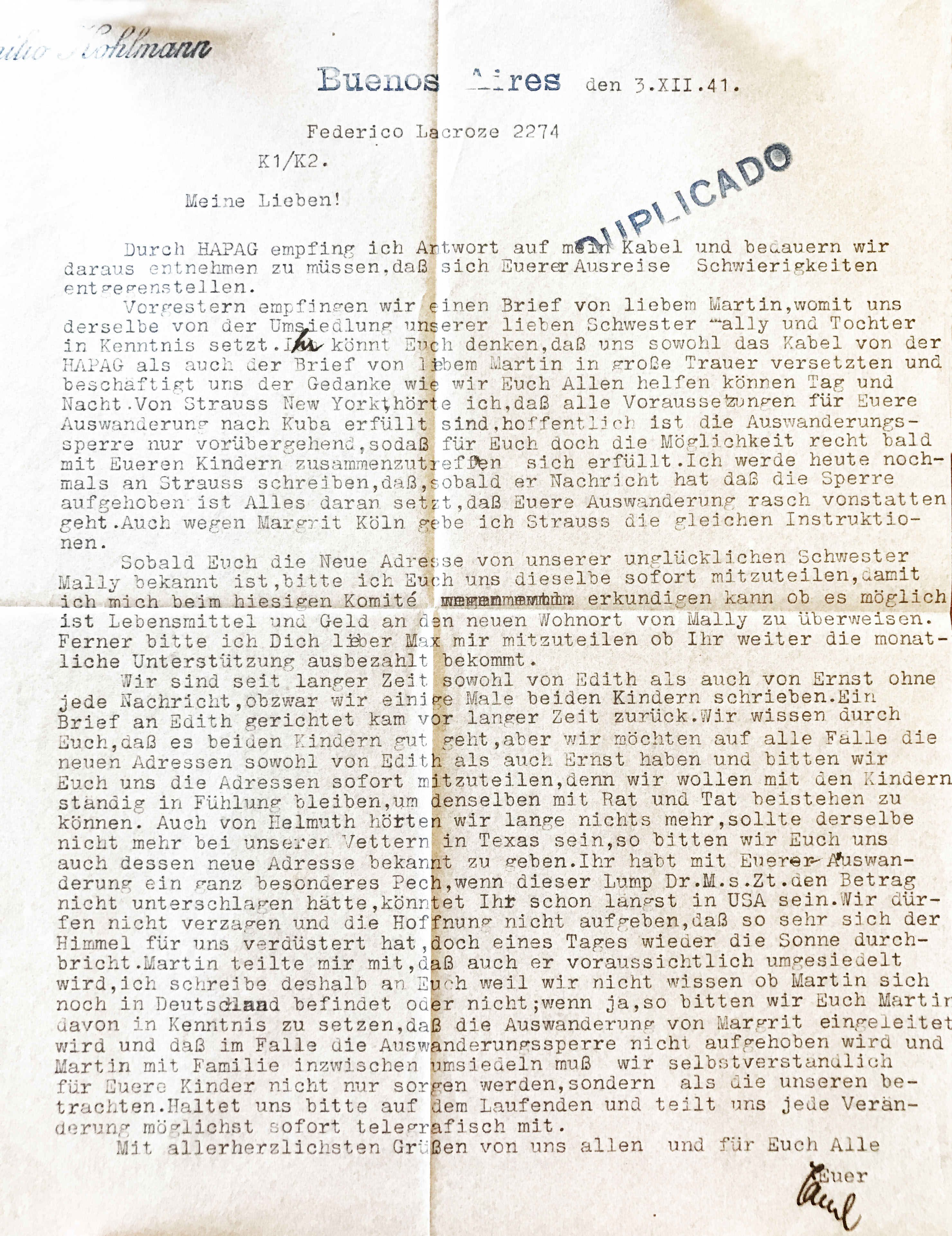
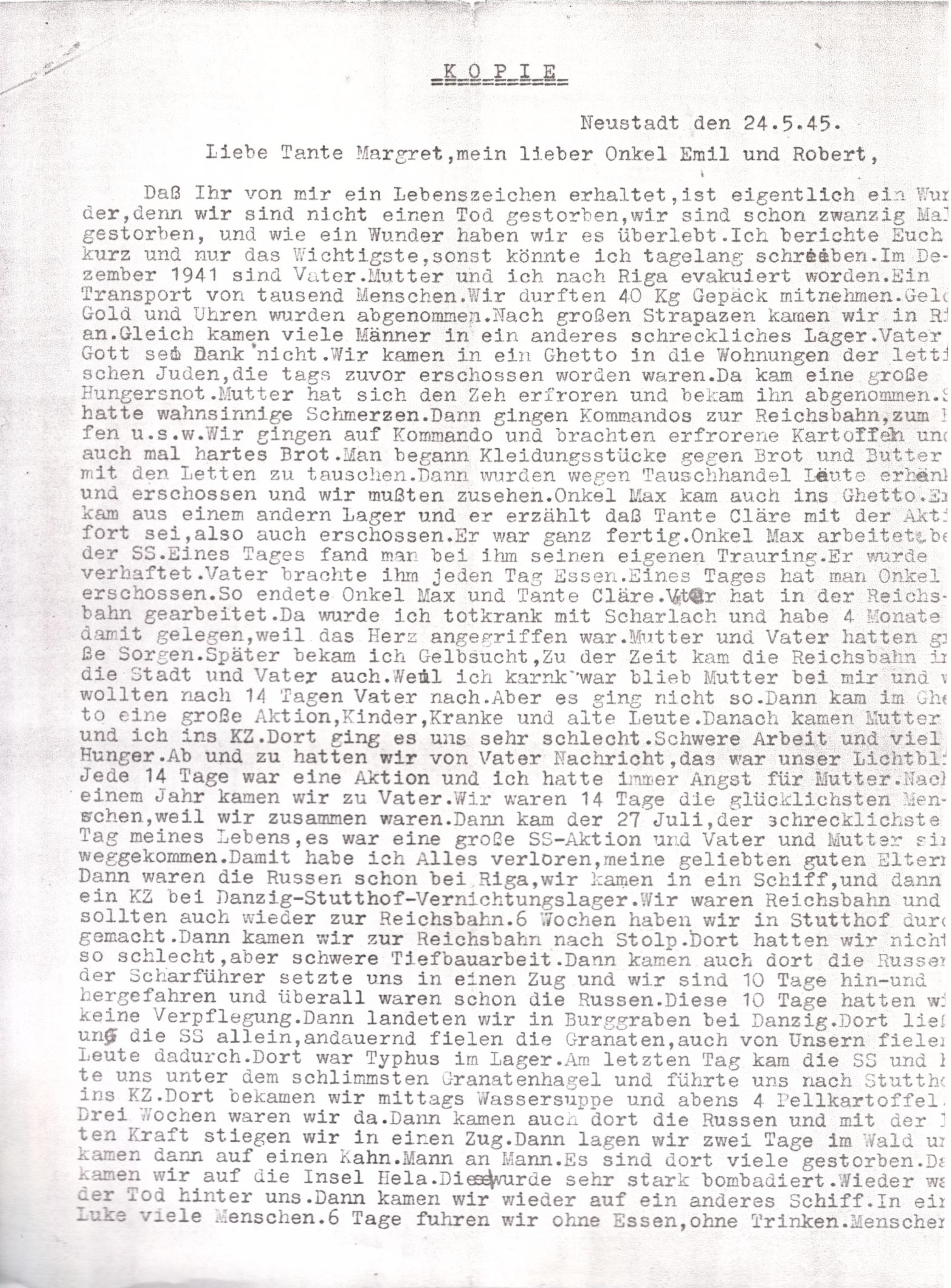
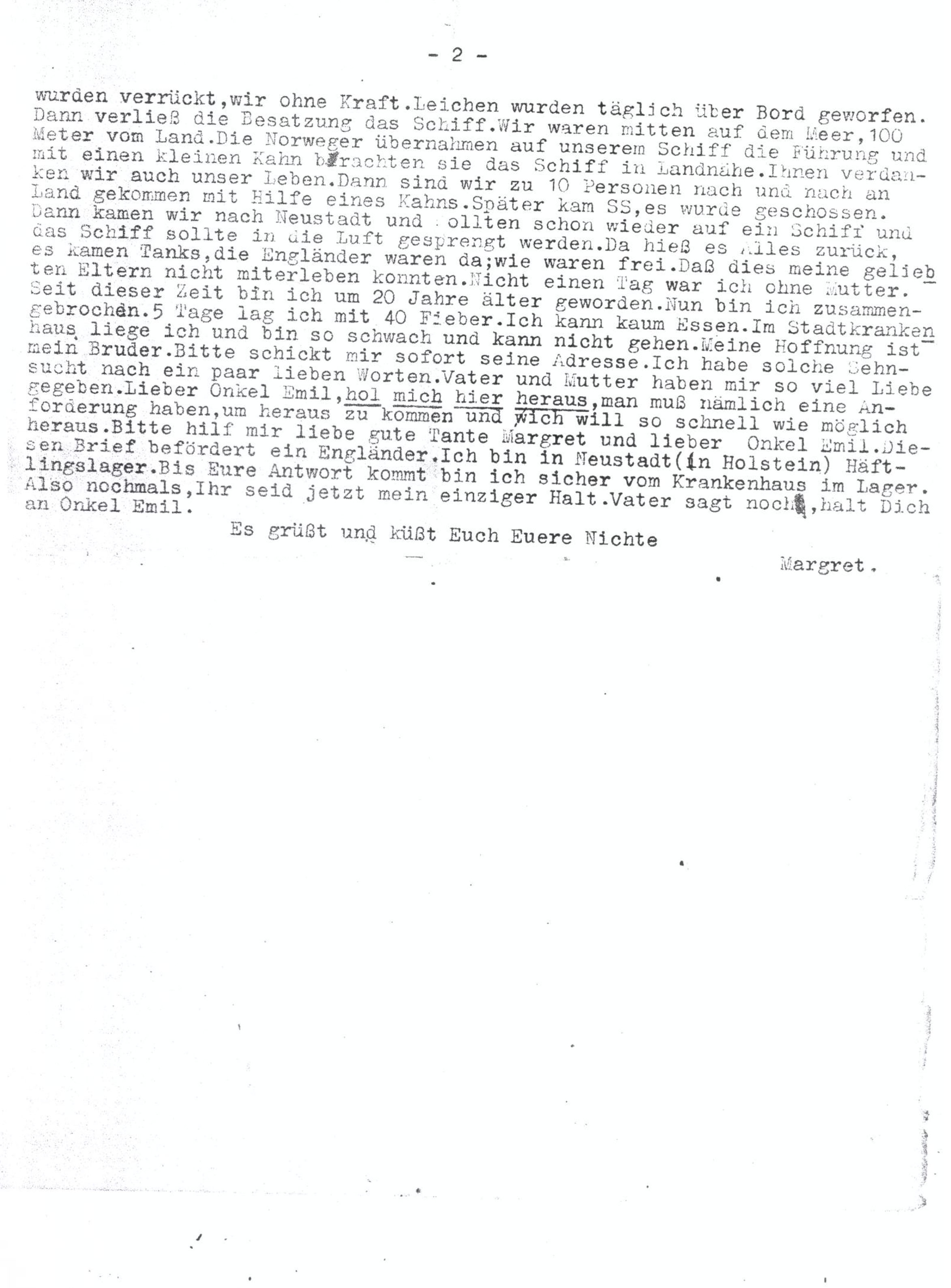
Sophia Staley
February 1, 2017Thanks for sharing. Unreal how we have not learned from history. Doing everything I can to oppose this Muslim ban.